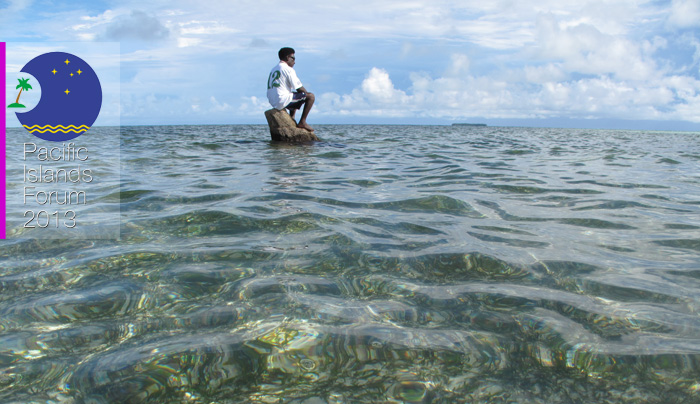
A Chief from the Carteret atolls sits on a coconut stump that used to mark the shoreline – Photo: Ben Bohane / wakaphotos.com
By Ben Bohane
The call for climate leadership is shaping up as the main issue for this year’s Pacific Island Forum summit being held in the Marshall Islands.
As if to underline the very real threat, the international airfield at Majuro which many delegates are landing on was recently flooded, highlighting the threat to critical infrastructure. The runway is also the country’s main water catchment.
Already the sparks are flying in a tense exchange between a Nobel-prize-winning scientist and the PIF Secretary General Tuiloma Neroni Slade at the opening of this year’s forum.
In hosting the 44th PIF summit, the Marshall Islands sees this as their opportunity to bang the drum loudly, and has given the theme “Marshalling the Pacific response to the climate challenge” and hoping to sign up leaders to the Majuro Declaration. We don’t know yet what is in the declaration, but there are some hints in comments made by some working on the draft.
Minister in Assistance to the President, Tony deBrum, has been on an international tour, dropping plenty of quotable quotes, saying it was time to bring in a new wave of climate leadership:
“Our hosting of the forum comes at the cusp of the most important geopolitical period for the region since World War ll. Business as usual will lead to a climate catastrophe and time is running out”, he says.
“We need to protect the next 50 years (with action) in the next five years. That’s the urgency. We don’t have the luxury of making these changes for the next 50 years. If we don’t have something substantial going in the next five, the battle is halfway lost.”
DeBrum visited Canberra last month with high hopes for support given that Australia is itself a substantial emitter but more importantly it has just assumed the chair of the UN Security Council. When making its case for a seat, Australia said it would help represent Pacific island interests and there is probably no more serious way they can help than by raising the climate change challenge, in security terms, as something of an emergency.
The focus on climate change comes as scientists say we have already passed a critical point – 400 parts per million of carbon in the atmosphere, setting a trajectory towards a global 4 degrees celcius temperature rise. Many eyes will also be on the next report by the peak UN body, the Intergovernmental Panel on Climate Change (IPCC), due for release at the end of this month, although there have already been leaks of the report.
The PIF summit will be a chance for Pacific nations to push the big powers like the US and China beyond platitudes and “aspirational” targets to offer something meaningful and concrete. But what, realistically can Pacific nations do to get their point across? They can’t wield a big stick or make threats themselves, so engaged diplomacy and public pressure remains their best tool. They can make the case that Pacific islanders are the canary in the coalmine for global humanity, but rather than highlighting our vulnerability, they can emphasise what the Pacific offers the world in terms of human knowledge, culture and the natural resources at stake. Most Pacific islanders quite naturally live sustainable lives compared to the rest of the world.
The problem with the biggest emitters like the US is that its Congress is hostage to commercial interests, particularly the fossil-fuel lobby. Even if President Obama wanted to, he faces an extremely difficult challenge in getting Congress to act. While Australia and the EU at least have had a carbon price in place, and China becomes the largest manufacturing base for renewable energy technology, US leadership on this vital global issue does not really exist beyond rhetoric.
Then I read about New York city’s mayor Michael Bloomberg attempts at action through his chairmanship of the C40 Cities Climate Leadership Group, representing 40 of the world’s biggest cities. As he points out, cities are responsible for producing 70% of the world’s emissions, given that more than half of humanity now live in cities.
“That puts cities on the frontline of the battle against climate change – and more and more cities are leading the charge” he says.
Bloomberg has put New York city on a path to reducing its greenhouse gas emissions by 30% by 2030. Ok, that’s still not enough, but it’s more than what is happening at a national level.
It occurred to me that if they really want to put pressure on big emitters, perhaps Pacific leaders should stop inviting big countries to the post-Forum dialogue and start inviting big cities as a way to tackle climate change. Forget Secretary of State John Kerry, or whoever China sends as their national delegate leader. Bring the mayors of New York, Beijing and other big cities together and they might actually get something done to make the Majuro Declaration a rock instead of a sandcastle eaten by the tide. As Mayor Bloomberg says:
“Mayors are pragmatists, not partisans; innovators, not ideologues. We are responsible for delivering results, not debating politics. And as the world becomes increasingly more urban, the importance of bold local action – particularly on climate change – will continue to grow.”


